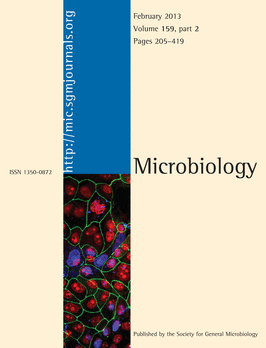
MICROBIOLOGY-SGM
Scope & Guideline
Fostering collaboration in the ever-evolving field of microbiology.
Introduction
Aims and Scopes
- Microbial Physiology and Metabolism:
Research exploring the metabolic pathways, regulatory mechanisms, and physiological adaptations of microorganisms under various environmental conditions. - Microbial Pathogenesis and Host Interactions:
Studies investigating the mechanisms of pathogenicity in bacteria and fungi, their interactions with host organisms, and the implications for health and disease. - Antimicrobial Resistance and Drug Development:
Research focused on understanding the mechanisms of resistance to antimicrobial agents, development of new therapeutic strategies, and implications for public health. - Microbial Ecology and Evolution:
Investigations into the diversity, community structure, and evolutionary dynamics of microbial populations in various environments, including clinical, agricultural, and natural settings. - Synthetic Biology and Biotechnology:
Research that applies synthetic biology principles to manipulate microbial systems for biotechnological applications, including bioengineering and the production of bioactive compounds. - Biofilm Formation and Control:
Studies addressing the formation, architecture, and resilience of biofilms, including strategies for their control and implications for infection and industrial processes.
Trending and Emerging
- Quorum Sensing and Communication:
There is an increasing focus on the mechanisms of quorum sensing and cell-cell communication among microbial communities, highlighting their role in biofilm formation and virulence. - Microbial Genomics and Metagenomics:
Research utilizing genomic and metagenomic approaches to explore microbial diversity, functional capabilities, and evolutionary relationships is on the rise, enabling more comprehensive insights into microbial ecosystems. - Microbiome Studies:
The impact of microbiomes on health, agriculture, and the environment has gained prominence, with studies investigating the roles of microbial communities in disease, immunity, and ecosystem functioning. - Environmental Microbiology and Bioremediation:
There is a growing interest in the role of microorganisms in environmental processes, including bioremediation and the cycling of nutrients, driven by the need for sustainable solutions to environmental challenges. - Host-Microbe Interactions:
Research exploring the complex interactions between microorganisms and their hosts, including mechanisms of immune evasion and symbiosis, is increasingly relevant in both health and disease contexts.
Declining or Waning
- Traditional Antimicrobial Agents:
There has been a noticeable decrease in papers focusing solely on traditional antibiotics, as the field shifts towards exploring alternative therapies and understanding resistance mechanisms. - Basic Taxonomic Studies:
Research primarily focused on the taxonomy of microorganisms, without a functional or ecological context, has waned, giving way to studies that integrate ecological and functional insights. - Single-Organism Studies:
The trend towards studying microorganisms in isolation is declining, as there is a growing emphasis on understanding microbial interactions within communities and ecosystems. - Static Microbial Models:
Research relying on non-dynamic, static models for studying microbial behavior and interactions is decreasing, with a shift towards more complex, dynamic systems that better represent real-world conditions.
Similar Journals
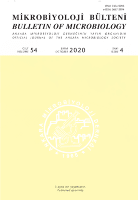
MIKROBIYOLOJI BULTENI
Exploring Innovations in Infectious Disease ResearchMIKROBIYOLOJI BULTENI, with ISSN 0374-9096, is a prestigious academic journal published by the ANKARA MICROBIOLOGY SOC, located in Ankara, Turkey. Established in 1973, this journal has been a vital conduit for disseminating research in the fields of Immunology, Microbiology, and Infectious Diseases, garnering a reputation as a significant contributor to the scientific community. The journal is currently ranked in the Q3 category within Immunology and Microbiology (miscellaneous), and Infectious Diseases, indicating its impactful presence amidst contemporary research. With access options that may be restricted, MIKROBIYOLOJI BULTENI actively welcomes submissions that advance the understanding of critical microbiological principles and practices, thereby supporting both national and international research efforts. Researchers, professionals, and students are encouraged to explore the latest findings shared in this journal, as it continually shapes the landscape of microbiology and infectious disease studies through its comprehensive and rigorous peer-reviewed publications.

Microbiology Spectrum
Bridging disciplines in the realm of microbiological studies.Microbiology Spectrum is a prominent peer-reviewed journal published by the American Society for Microbiology, dedicated to advancing the field of microbiology through the dissemination of high-quality research. Since its inception in 2013 and continuing until 2024, the journal has established a strong presence in key domains such as microbiology, immunology, cell biology, and ecology, achieving impressive quartile rankings including Q1 in Infectious Diseases and Q1 in Immunology and Microbiology as of 2023. With an emphasis on open access to its scholarly content, Microbiology Spectrum aims to foster collaboration and knowledge sharing among researchers, professionals, and students alike. The journal's scope encompasses a diverse range of topics pertinent to the field, making it an essential resource for anyone involved in microbiological research and its applications. Researchers looking to publish their findings in a respected journal will find Microbiology Spectrum's robust impact factor and Scopus rankings serve as testament to its significance and influence within the academic community.

TRENDS IN MICROBIOLOGY
Driving Progress in Medical Microbiology and VirologyTRENDS IN MICROBIOLOGY is a premier academic journal published by CELL PRESS, renowned for its high-impact research contributions in the fields of microbiology, infectious diseases, medical microbiology, and virology. With an impressive impact factor and a notable Scopus ranking—placing it in the top tiers of its categories, including a remarkable Q1 status in multiple disciplines—this journal is essential for researchers, professionals, and students aiming to stay at the forefront of innovative microbial research and ongoing advancements in pathogen biology. Since its inception in 1993, TRENDS IN MICROBIOLOGY has provided a platform for thought-provoking reviews and critical insights, fostering discussions that shape the future of the microbiological sciences. Based in the United Kingdom, TRENDS IN MICROBIOLOGY continues to lead the way in disseminating vital knowledge within the global scientific community.

ARCHIVES OF MICROBIOLOGY
Elevating Research Standards in Microbial StudiesThe Archives of Microbiology, published by Springer, is a reputable journal in the field of microbiology, serving as a vital platform for the dissemination of groundbreaking research and critical reviews since its inception in 1974. With an ISSN of 0302-8933 and an E-ISSN of 1432-072X, this journal operates out of Germany and maintains a global reach, promoting high-quality scholarship across multiple disciplines, including biochemistry, genetics, and molecular biology, as evidenced by its Q2 ranking in Medicine (miscellaneous) and consistent Q3 placements in other categories in 2023. Although the journal does not offer open access options, its rigorous peer-review process ensures that published articles are of the highest standard, making it an essential resource for researchers, professionals, and students keen on advancing their understanding of microbial sciences. As the journal converges toward 2024, it remains committed to fostering innovative microbiological research and facilitating interdisciplinary dialogue within the scientific community.

MICROBIOLOGY
Uncovering the Hidden World of MicroorganismsMICROBIOLOGY (ISSN: 0026-2617, E-ISSN: 1608-3237), published by MAIK NAUKA/INTERPERIODICA/SPRINGER, is a pivotal journal in the field of microbiological research, operating from the vibrant hub of New York, United States. With a focus on the intricate relationships and functionalities of microorganisms, MICROBIOLOGY serves as an essential resource for professionals and researchers dedicated to advancing the knowledge of applied microbiology and biotechnology. As of 2023, it holds a competitive Q3 and Q4 category ranking in Applied Microbiology and Biotechnology and Microbiology, respectively, reflecting its commitment to high-quality and impactful research. Although currently not open access, the journal extends comprehensive insights into critical topics that span environmental microbiology, clinical applications, and biotechnology advancements, making it a vital platform for disseminating innovative findings in this ever-evolving discipline. Researchers and students alike will find MICROBIOLOGY to be an invaluable addition to their academic and professional repertoire.
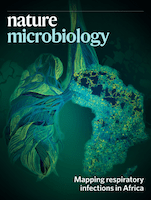
Nature Microbiology
Transforming Insights into Impactful DiscoveriesNature Microbiology is a premier journal published by NATURE PORTFOLIO that has firmly established itself within the realms of microbiological research since its inception in 2016. Based in the United Kingdom, this prestigious journal specializes in the intricacies of applied microbiology, cell biology, genetics, immunology, and medical microbiology, making it a cornerstone for academics and professionals alike. With an impressive Scopus ranking placing it in the top tier across various relevant categories—such as rank #3 in Genetics and #2 in Applied Microbiology—it underscores the journal’s commitment to high-quality, impactful research. Although it operates under a subscription model, Nature Microbiology's broad Open Access policy facilitates greater dissemination and visibility for its authors. The journal's objectives are centered around publishing cutting-edge advancements that enhance our understanding of microbial life, its interactions, and applications in health and disease. As a Q1 journal across multiple disciplines, it holds immense significance for researchers, professionals, and students enthusiastic about the latest innovations and breakthroughs in microbiology.
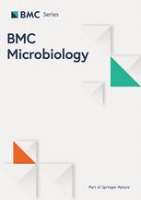
BMC MICROBIOLOGY
Transforming health and environment through microbiological excellence.BMC Microbiology is a leading open access journal published by BMC, dedicated to advancing the field of microbiology since its inception in 2001. With an ISSN of 1471-2180, this journal provides a vital platform for researchers, professionals, and students to share and access high-quality research and innovation in both general and medical microbiology. Based in the United Kingdom, BMC Microbiology holds a commendable Q2 ranking in both various microbiological categories according to the 2023 Scopus rankings, indicating its strong influence in the microbiological community, with a rank of #47 out of 140 in Medical Microbiology and #62 out of 182 in general Microbiology. The journal's commitment to open access ensures that groundbreaking research is freely available to facilitate collaboration and knowledge sharing among the global community of microbiologists. With a focus on publishing original research, reviews, and case studies, BMC Microbiology plays a critical role in disseminating information that can impact health and environmental conditions around the world.
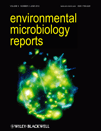
Environmental Microbiology Reports
Transforming Environmental Science through Microbial PerspectivesEnvironmental Microbiology Reports, published by WILEY, is a prestigious journal dedicated to the field of environmental microbiology, exploring the intricate interactions between microorganisms and their environments. With an ISSN of 1758-2229, this journal has established itself as a crucial resource for researchers, professionals, and students interested in the latest advancements and applications in microbial ecology, soil science, and environmental sustainability. Since its inception in 2009, the journal has grown in impact and reputation, proudly ranked in the Q1 category for both Agricultural and Biological Sciences and Ecology, Evolution, Behavior and Systematics as of 2023. Notably, it occupies the 17th position out of 193 in its subcategory based on Scopus rankings, showcasing its significance within the field. Although it does not currently offer open access options, the high-quality research published in this journal continues to contribute significantly to the understanding of microbial roles in environmental processes, emphasizing the vital role of microbes in maintaining ecosystem health and promoting sustainable practices.

MOLECULAR MICROBIOLOGY
Pioneering Research in Microbial ProcessesMOLECULAR MICROBIOLOGY is a prestigious academic journal published by Wiley that has been at the forefront of research in the fields of microbiology and molecular biology since its inception in 1987. With an impressive Q1 rating in Microbiology and a Q2 rating in Molecular Biology for 2023, this journal serves as a vital platform for disseminating high-impact research that advances our understanding of microbial processes and interactions at the molecular level. The journal's ISSN is 0950-382X, and the E-ISSN is 1365-2958, making it easily accessible to a global audience of researchers, professionals, and students. Though not an Open Access journal, MOLECULAR MICROBIOLOGY remains committed to providing valuable insights and fostering knowledge exchange in the academic community. Situated in the United Kingdom and indexed in prominent databases like Scopus, the journal holds a strong standing, with current rankings reflecting its influential role in the academic landscape. Researchers in the field are invited to contribute and engage with cutting-edge discoveries that will shape the future of microbiological sciences.
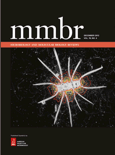
MICROBIOLOGY AND MOLECULAR BIOLOGY REVIEWS
Fostering Knowledge in the World of Microbiology and Molecular BiologyMICROBIOLOGY AND MOLECULAR BIOLOGY REVIEWS, published by the American Society for Microbiology, is a premier journal dedicated to advancing the fields of microbiology and molecular biology. With an impressive impact factor reflective of its Q1 ranking in categories such as Immunology, Infectious Diseases, and Molecular Biology, this journal consistently showcases high-quality, peer-reviewed articles that contribute to the current understanding of microbial life and molecular mechanisms. Operating since 1997, the journal aims to bridge the gap between microbiological methods and molecular biology applications, making it an essential resource for researchers, professionals, and students alike. Readers can access content through various platforms, ensuring that the latest findings are readily available to the scientific community. With its esteemed reputation, MICROBIOLOGY AND MOLECULAR BIOLOGY REVIEWS remains a leading voice in the exploration of the life sciences, catering to a broad audience deeply invested in unraveling the complexities of microbial and molecular systems.